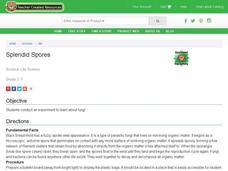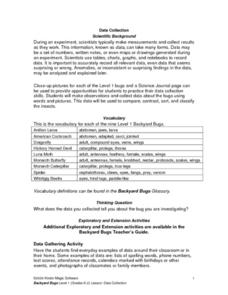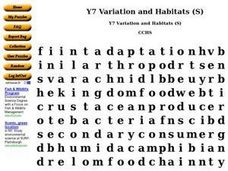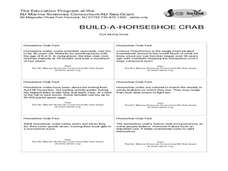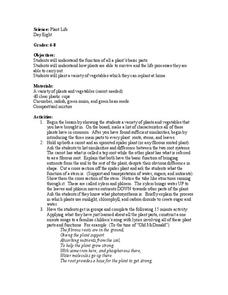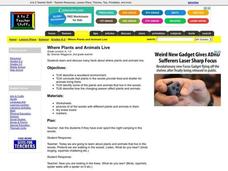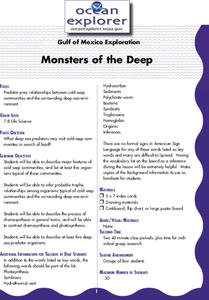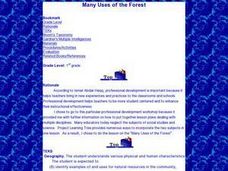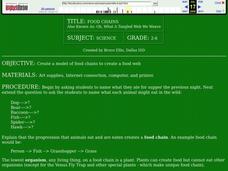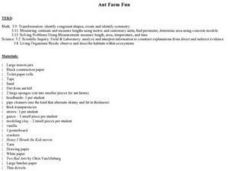Curated OER
Splendid Spores
Students explore fungi. In this fungi lesson, students take a slice of bread and leave it outside for a day. Students record their observations of the fungi on the bread the following day.
National First Ladies' Library
Leeches and Spiders and Toads, Oh, My! The Emergence of Modern Medicine
Students explore the basic ideas and beliefs about medicine in the 18th and 19th centuries. They write a news account to be published in a "medical journal" developed by the class. Each "article" in the journal should be dated...
Curated OER
Science: Backyard Bugs Data Collection
Students practice data collection skills by observing common bugs found in their local environment. Once the data is collected they complete data sheets to compare, contrast, sort, and classify the insects. The lesson plan includes...
Curated OER
Y7 Variation and Habitats (S)
In this biology worksheet, students identify and locate various vocabulary terms relating to variations and habitats of living things. There are 37 biology terms located in the word search.
Curated OER
Arthropods Crossword
In this arthropods worksheet, students complete a crossword puzzle with 41 questions about the different types and behaviors of arthropods.
Curated OER
Build-A-Horseshoe Crab
Students discover many facts about horseshoe crabs. Students identify the main body parts of horseshoe crab. They explore the habits of the horseshoe crab and their importances to the ecosystem. Adaptations for younger students are...
Curated OER
Jewel of the Earth
Students investigate several organisms, set sticky traps to collect them, and attempt to identify and classify them using a variety of sources. The origins of the organisms are traced and their adaptive features examined.
Curated OER
Ecosystems - Lessons 1 and 3
In this biology worksheet, students answer 22 multiple choice questions on ecosystem. They identify which ecosystem component is described in each of the question.
Curated OER
Plant Life
Students study plant parts and their functions. In this plant life lesson plan students participate in an activity of planting plants.
Curated OER
Where Plants and Animals Live
Pupils explore and discuss facts about a woodland environment, the plants and animals that live there, and changing seasons in the woods. They conclude that plants in the woods provide food and shelter for animals living there.
Curated OER
Arthropod Key
Learners identify the types of pests and categorize them. They identify their food chain and create a poster showing the food chain for the pests.
Curated OER
Create a Soil Aggregate
Students simulate the conditions which occur in a soil aggregate. They explain how IPM affects the environment. They identify the cast of characteristics to develop their aggregate.
Curated OER
Food Web
Students are able to define food web, and identify the interdependence of organisms within a system. They are able to describe how natural events and human activities can impact a food web.
Curated OER
My Tarantula Book
In this tarantula worksheet, students complete a tarantula book that has activities including a word search, coloring, reading, and more. Students complete 11 pages.
Curated OER
Hand Print Adjective Booklet
Young scholars practice using adjectives by describing animals, pictures or insects. In this language arts lesson, students collaborate to brainstorm a list of adjectives which they turn into an adjective booklet. Young...
Curated OER
Neuroscience Word Origins
In this neuroscience worksheet, learners match neuroscience words with the illustration that represents the original meaning of the word in Greek or Latin. This worksheet has 10 matching questions.
Curated OER
Bug Hunt
Students examine the different characteristics of bugs in their local area. They take characteristics of bugs they have observed and create their own new insect. They draw their new bug and share it with the class.
Curated OER
Interesting Insects
Students discover the characteristics of insects. They explore insects through cooperative learning, group projects, hands on activities, and poetry. They gain knowledge of insect life cycles, habitat, and physical characteristics.
Curated OER
Monsters of the Deep
Learners describe major features of cold seep communities, and list at least five organisms typical of these communities. They infer probable trophic relationships among organisms typical of cold-seep communities.
Curated OER
Monsters of the Deep
Students describe major features of cold seep communities and list the organisms that are typical in these communities. In this deep sea environment lesson students work in groups and research their given cold seep group.
Curated OER
Many Uses of the Forest
First graders examine pictures of forest wildlife and identify different animals that live in the forest. They discuss resources the forest provides for human use and explore the concept that the forest is used by many at the same time.
Curated OER
Ant Farm Fun
Third graders investigate ants and anthills in this series of lessons. They create their own Ant Farm.
Curated OER
The Pests of Summer
Students research insects that act as pests during the summer months. They investigate how to protect themselves and their homes from these pests. They study the life cycle of the cicada.
Other popular searches
- Spiders and Science
- Life Science Spiders
- Science Spiders vs Insects
- Earth Science Spiders
- Elementary Science Spiders
- Physical Science Spiders
